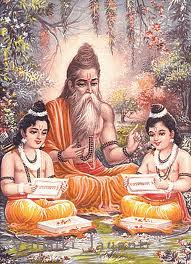After finishing the Epic satisfactorily, Sage Valmiki, with his eyes closed, was thinking as to how to make this known to the world....who will render this ballad...
He suddenly felt something on his feet. He opened his eyes and looked down. He saw the lovely kids Lava and Kusha, who were in the attire of hermits, touching his feet. Glorious Kusha and Lava were the virtue knowing princes, and they were endowed with melodious voice, besides being the residents of the same hermitage. They were saluting at his feet. On seeing that pair of intellectuals who were proficient in Veda-s, sage Valmiki made his decision. These two were the very persons to memorize the epic, as the epic Ramayana was composed only to reinforce the import of Veda-s, as an ancillary.
The two princes memorized the best, amazing, awesome, sublime, stunning and wonderful epic in its entirety and in doing so, they rendered that epic faultlessly. They sang the epic as schooled, well aware of its content and intent, among the assemblages of audiences like sages, scholars and also of other eminent persons, with their best concentration.
They were conversant with the art of music too and proficient with the pitch and pausing their voices. The two brothers had not only a wealthy voice, but they also looked like celestial singers.
Those two kids were endowed with musical talent with all its remarkable features, sang this epic, standing in the midst of gatherings of sages, pious souls etc.... On hearing that, the eyes of all were overspread with tears of happiness, and they appreciated saying, 'splendid, splendid is this...' All those saints being the saint-patrons of virtue were pleased at heart, and praised the praiseworthy Kusha and Lava, while they were singing.
The two were singing the epic everywhere on the streets of Ayodhya and their fame spread like a wildfire. On one such occasions the king himself saw them. The king was none other than Rama, our hero.
Rama wanted the two kids to sing the epic at his palace. The lads agreed and went to the palace.
At the palace the king Rama was sitting on a divine golden throne surrounded by his ministers, and his brothers sitting nearby him. Having seen the mannerly young brothers endowed with beautiful features, Rama spoke to his brothers Lakshmana, Shatrughna and Bharata and to the courtiers "Let this ballad be keenly heard from these divinely resplendent brothers, for it contains versatile words and meanings..." This was said by the king to motivate the singers. He then added "These two saint-like Kusha and Lava, who also possess kingly features, but they are great hermits... this narration is endowing good fortune to me also, listen to that great efficacious legend [of Seetha...]"
The two two singers started the ballad melodiously and effectually, with their clear and clarified voices, like the melody of string and rhythmic instruments, with very clear and meaningful intonation.
What they sang will be narrated in prose (in the present day spoken English, of course) from the next chapter and onwards.
=============================
He suddenly felt something on his feet. He opened his eyes and looked down. He saw the lovely kids Lava and Kusha, who were in the attire of hermits, touching his feet. Glorious Kusha and Lava were the virtue knowing princes, and they were endowed with melodious voice, besides being the residents of the same hermitage. They were saluting at his feet. On seeing that pair of intellectuals who were proficient in Veda-s, sage Valmiki made his decision. These two were the very persons to memorize the epic, as the epic Ramayana was composed only to reinforce the import of Veda-s, as an ancillary.
The two princes memorized the best, amazing, awesome, sublime, stunning and wonderful epic in its entirety and in doing so, they rendered that epic faultlessly. They sang the epic as schooled, well aware of its content and intent, among the assemblages of audiences like sages, scholars and also of other eminent persons, with their best concentration.
They were conversant with the art of music too and proficient with the pitch and pausing their voices. The two brothers had not only a wealthy voice, but they also looked like celestial singers.
Those two kids were endowed with musical talent with all its remarkable features, sang this epic, standing in the midst of gatherings of sages, pious souls etc.... On hearing that, the eyes of all were overspread with tears of happiness, and they appreciated saying, 'splendid, splendid is this...' All those saints being the saint-patrons of virtue were pleased at heart, and praised the praiseworthy Kusha and Lava, while they were singing.
The two were singing the epic everywhere on the streets of Ayodhya and their fame spread like a wildfire. On one such occasions the king himself saw them. The king was none other than Rama, our hero.
Rama wanted the two kids to sing the epic at his palace. The lads agreed and went to the palace.
At the palace the king Rama was sitting on a divine golden throne surrounded by his ministers, and his brothers sitting nearby him. Having seen the mannerly young brothers endowed with beautiful features, Rama spoke to his brothers Lakshmana, Shatrughna and Bharata and to the courtiers "Let this ballad be keenly heard from these divinely resplendent brothers, for it contains versatile words and meanings..." This was said by the king to motivate the singers. He then added "These two saint-like Kusha and Lava, who also possess kingly features, but they are great hermits... this narration is endowing good fortune to me also, listen to that great efficacious legend [of Seetha...]"
The two two singers started the ballad melodiously and effectually, with their clear and clarified voices, like the melody of string and rhythmic instruments, with very clear and meaningful intonation.
What they sang will be narrated in prose (in the present day spoken English, of course) from the next chapter and onwards.
=============================


